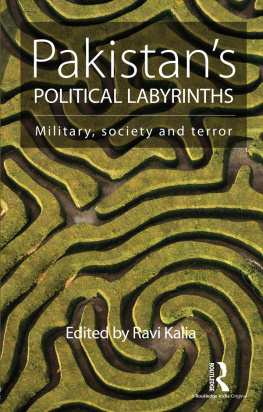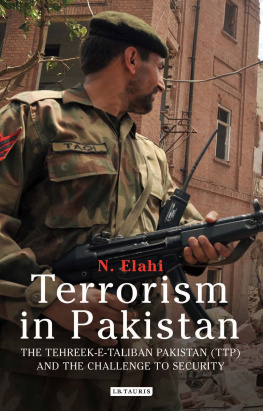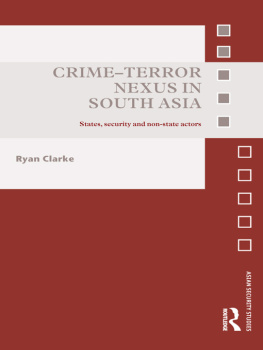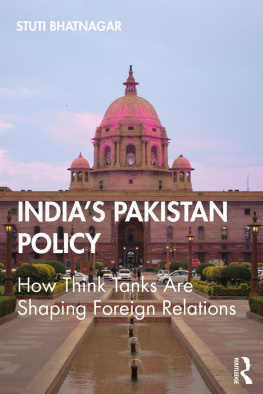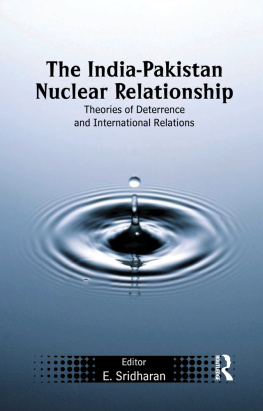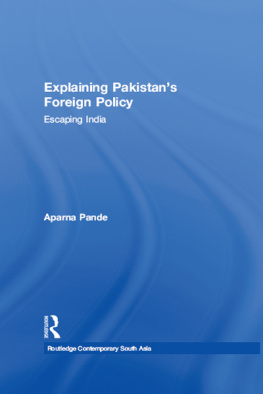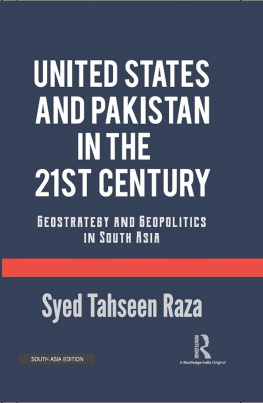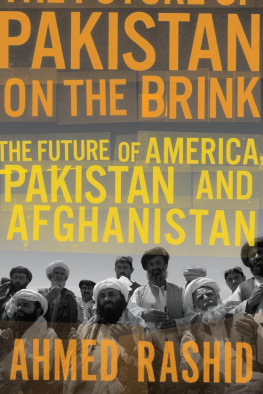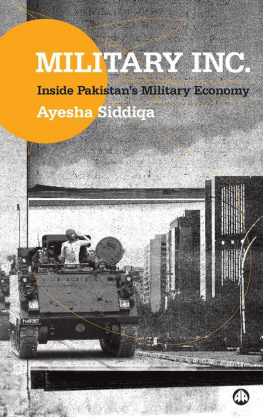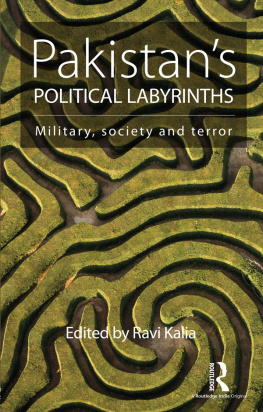Pakistans Political Labyrinths
This book explores Pakistan from different vantage points. It examines a variety of events in contemporary Pakistan through a comprehensive analysis of identity and power politics, media landscapes, military recruitment, role of madrasahs, terrorism and militancy, and civil war, as well as outlines future trajectories. It studies themes such as Pakistans relationship with India, the legacy of Jinnah, gender and fundamentalism, and urbanization and unrest that have plagued the northern areas. It further looks at the nation after the capture of Osama bin Laden and the changing nature of its relationship with the US in its aftermath.
Including contributions from experts in the field and policymakers across the world, this volume will interest scholars and researchers on Pakistan studies, politics and international relations. It will also appeal to government think tanks.
Ravi Kalia is Professor of History at the City College of New York and specializes in South Asian studies. He is designated as Distinguished Role Model by the Asian Alumni Group and is recipient of the Distinguished Service Award by the City College of New York.
Pakistans Political Labyrinths
Military, society and terror
Edited by Ravi Kalia
First published 2016
by Routledge
2 Park Square, Milton Park, Abingdon, Oxon OX14 4RN
and by Routledge
711 Third Avenue, New York, NY 10017
Routledge is an imprint of the Taylor & Francis Group, an informa business
2016 Ravi Kalia
The right of Ravi Kalia to be identified as the author of the editorial material, and of the authors for their individual chapters, has been asserted in accordance with sections 77 and 78 of the Copyright, Designs and Patents Act 1988.
All rights reserved. No part of this book may be reprinted or reproduced or utilised in any form or by any electronic, mechanical, or other means, now known or hereafter invented, including photocopying and recording, or in any information storage or retrieval system, without permission in writing from the publishers.
Trademark notice: Product or corporate names may be trademarks or registered trademarks, and are used only for identification and explanation without intent to infringe.
British Library Cataloguing-in-Publication Data
A catalogue record for this book is available from the British Library
Library of Congress Cataloging-in-Publication Data
A catalog record has been requested for this book
ISBN: 978-1-138-92655-4 (hbk)
ISBN: 978-1-315-68319-5 (ebk)
Typeset in Goudy
by Apex CoVantage, LLC
Contents
Aparna Pande
J. Andrew Greig
Gilles Boqurat
C. Christine Fair
Stephen Tankel
Laurent Gayer
Steven Barracca
Tahmina Rashid
Martin Skefeld
Steve Barracca is Associate Professor of Government at Eastern Kentucky University, where he teaches courses on comparative politics and political theory. His research focuses on democratization and civilmilitary relations in Latin America and in Pakistan.
Gilles Boqurat holds a PhD in History from the University of Paris 1-Sorbonne and is specialized on South Asian affairs. He has spent a number of years in India (Jawaharlal Nehru University, French Centre for Human Sciences, New Delhi) and in Pakistan (Institute of Strategic Studies, Islamabad). He has also been in charge of the South Asia Program at the French Institute of International Relations and is now associated with the Foundation for Strategic Research in Paris.
C. Christine Fair is Assistant Professor at Georgetown University at the Center for Peace and Security Studies (CPASS) within the Edmund A. Walsh School of Foreign Service. She has authored, among other publications, The Madrassah Challenge: Militancy and Religious Education in Pakistan (2008), and has written numerous peer-reviewed articles covering a range of security issues in South Asia.
Laurent Gayer is Research Fellow at the Centre National de la Recherche Scientifique (CNRS, France), posted at the Centre dEtudes et de Recherches Internationales (CERI), Paris. He is the author of the recently published Karachi: Ordered Disorder and the Struggle for the City (2014).
J. Andrew Greig retired from the US Foreign Service with the United States Information Agency and the Department of State. He served as senior country desk officer for Pakistan and as an analyst in the Bureau of Intelligence and Research. His overseas postings included France, India, and Turkey. He has a PhD from the University of California, Los Angeles in South Asian History.
Aparna Pande is Research Fellow and Director of Hudson Institutes Initiative on the Future of India and South Asia. She is the author of Explaining Pakistans Foreign Policy: Escaping India (2011). Her major field of interest is South Asia, with a special focus on India, Pakistan, foreign policy, security studies, religion in politics, and political Islam.
Tahmina Rashid is Associate Professor in International Studies, at the University of Canberra, Australia. She is the author of Contested Representations: Punjabi Women in Feminist Debates in Pakistan (2006).
Martin Skefeld is Professor and Head of the Department of Social and Cultural Anthropology at Ludwig-Maximilians-University, Munich. His recent publications include Struggling for Recognition: The Alevi Movement in Germany and in Transnational Space (2008).
Stephen Tankel is Assistant Professor in the School of International Service at American University and a non-resident scholar in the South Asia Program at the Carnegie Endowment for International Peace. He is currently on leave, working as an Advisor for Asian and Pacific Security Affairs at the Department of Defense. He is the author of Storming the World Stage: The Story of Lashkar-e-Taiba (2011).
This volume follows the earlier one, Pakistan: From the Rhetoric of Democracy to the Rise of Militancy, published in the spring of 2011.
Even as the earlier volume was in the production process, a series of events occurred that underscored the enormous structure of the Pakistani state and its Establishment. And equally, the growing distrust between the United States and Pakistan as its ally in the war on terror. On 27 January 2011, Raymond Davis, a CIA contractor, killed two reportedly armed men who tried to rob him in Lahore, the capital of Pakistani Punjab. Davis was arrested for the alleged crime thus saved from a lynching mob but the episode quickly gained byzantine proportions. On the one hand, it exposed Americas expanding network of CIA operatives working clandestinely in Pakistan, and on the other, it revealed Americas growing distrust of its non-NATO ally. For the Pakistani Establishment, the Davis affair was emblematic of American arrogance. Davis ultimately left Pakistan after the Obama administration paid blood money to the families of the victims.
On 2 May 2011, the US special forces raided Abbottabad, the cantonment town founded by the English General James Abbott in 1853 and that now is home to the Pakistan Military Academy, killing Osama bin Laden in his mansion. Instead of investigating how bin Laden came to live there for several years, the military took a nationalistic stance by focusing on the violation of Pakistani sovereignty by the US forces. The Obama administration, weary of its relations with Pakistan, elected not to press the point. There is thinking in certain academic and policy quarters that, given Pakistans nuclear arsenal, it is safer to keep Pakistan in an embrace rather than letting it spin out on its own.

